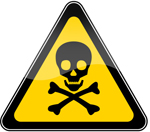 Chemical exposure seems an unavoidable reality at times. Everywhere you go, whether it’s inside your home, outside on the streets, or at work in the office, chemicals are being emitted from various objects or materials. You may have very little control over some of these chemicals when it comes to exposure — car exhaust in an urban city is a good example. However, there are some chemicals that you can definitely try to avoid, while at the same time lowering your risk for cancer, irritable bowel syndrome (IBS), eye disease, and a number of other health problems. So here’s some timely health advice about 10 toxins that are within your power to avoid.
Chemical exposure seems an unavoidable reality at times. Everywhere you go, whether it’s inside your home, outside on the streets, or at work in the office, chemicals are being emitted from various objects or materials. You may have very little control over some of these chemicals when it comes to exposure — car exhaust in an urban city is a good example. However, there are some chemicals that you can definitely try to avoid, while at the same time lowering your risk for cancer, irritable bowel syndrome (IBS), eye disease, and a number of other health problems. So here’s some timely health advice about 10 toxins that are within your power to avoid.
1. Avoid cookware treated with anti-stick chemicals. This can include such coatings as “Teflon” commonly found in frying pans. Look for stainless steel or cast iron cookware and use a little olive oil to keep food from sticking to the pan. You are better off soaking cookware after use and using a little elbow grease to clean rather than ingesting chemicals found in non-stick coatings.
2. Use green household cleaners. Gone are the days when you could use chemical warfare inside your home. Your home has now become your sanctuary from chemicals that permeate the outdoor air. Stay away from chlorine, ammonia and other toxic chemicals. It’s time to use vinegar, borax, lemon and baking soda.
3. Be wary of cosmetics. They contain a number of substances that could be harmful to your health, such as parabens and phthalates. Both these chemicals can disrupt your endocrine system. Go natural and buy alternative products that are free off such ingredients. While you’re at it, the next time you buy soap, or shampoo, or toothpaste, get products that aren’t tested on animals.
4. Stay away from plastics. That means plastic cutlery, plastic bags, plastic containers, and plastic wrap. Don’t microwave your lunch in a plastic container. Plastic contains a number of chemicals that could negatively impact your health. If you need some plastic in your life, look for labels that that state “Free of BPA.”
5. Be careful eating canned fish. Some brands of tuna and salmon contain high amounts of mercury. Even farmed salmon could be full of nasty chemicals like DDT, PCBs and dioxin. You can lessen your exposure to mercury by buying canned skipjack, yellow or tongol tuna instead of albacore tuna (which is said to be highest in mercury).
6. Eat organic food. Yes, it’s more expensive…yes, it’s a little harder to find. But conventional food can be sprayed heavily with harmful insecticides and pesticides that are invisible to your eyes.
RECOMMENDED: Organic Foods Have Become Mainstream
7. Try to avoid products containing triclosan — an anti-bacterial agent commonly used in soaps, deodorants and even facial tissues. Triclosan can negatively affect your hormones, create antibiotic resistance to bacteria, and harm aquatic life when it is washed into sewer pipes.
8. Avoid dry cleaners as much as possible. If you do have clothes that have to go to the cleaners, look for an environmentally friendly business that doesn’t use harmful solvents like PERC.
9. Be wary of commercial candles, incense and air fresheners. These products could be full of phthalates and parabens that can significantly compromise the quality of breathable air inside your home.
10. New furniture (and old furniture, for that matter) can emit a number of chemicals from formaldehyde to flame retardants. Purchase carefully, spend a little more and try to buy chemical-free tables, mattresses, carpets and shelving.
